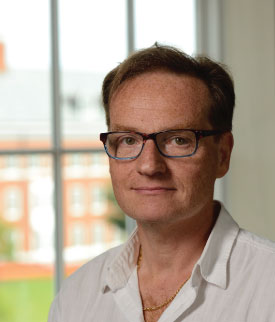 Professor of Applied Mathematics and Statistics
Professor of Applied Mathematics and Statistics
Whiting School of Engineering, JHU
Email: laurent.younes@jhu.edu
Phone: 410 516 5103
Johns Hopkins University
Clark Hall, 324C
3500 N Charles St.
Baltimore MD 21209
Research Departments
- Center for Imaging Science
- Mathematical Institute for Data Science
- Institute for Computational Medicine
About
Laurent Younes is a professor of the Department of Applied Mathematics and Statistics at JHU. He is a member and current director of the Center for Imaging Science. He was chairman of the Department of Applied Mathematics and Statistics from 2014 to 2020.
His research focuses on computational anatomy, shape analysis, graphical models, machine learning and computational biology.
He earned his doctorate at the University Paris 11 (Orsay).
Education and Career
Laurent Younes was a student of the Ecole Normale Supérieure in Paris (mathematics) from 1983 to 1987, period during which he obtained a master’s degree in Statistics (1985, University Paris 11, Orsay). He completed his Doctorate degree in Statistics in 1988 (University Paris 11). His thesis focused on estimation algorithms for Markov random fields. He then entered the CNRS in University Paris 11, then in the Ecole Normale Supérieure in Cachan, where he obtained the rank of “Directeur de Recherche” in 1998. He passed his “Habilitation” degree at the University Paris 11 in 1995.
He moved to Johns Hopkins University as an Associate Professor in Applied Mathematics and Statistics in 2003 and became Full Professor in 2005. He is a fellow of the Institute for Mathematical Statistics and of the American Mathematical Association.
Research
Laurent Younes’s research interest and expertise are at aninterface between Applied Mathematics, Statistics and Biomedical Engineering, and has published papers in journals covering all these fields. His research accomplishments include the development of maximum-entropy learning algorithms for graphical models, the invention of new concepts in mathematical shape analysis and their translation into feasible algorithms and novel methodologies in Computational Anatomy. In this domain, he has designed or co-designed several core diffeomorphic registration algorithms, including the LDDMM (large deformation diffeomorphic metric mapping) methods for image, surface or curve registration. He actively participated in, or co-led, several published studies in statistical shape analysis, on pathologies including schizophrenia, Alzheimer’s and Huntington diseases, hypertrophic cardiomyopathy and tuberculosis. He also published papers in Computational Biology, involving in particular the development of new analytical methods for gene expression data and
